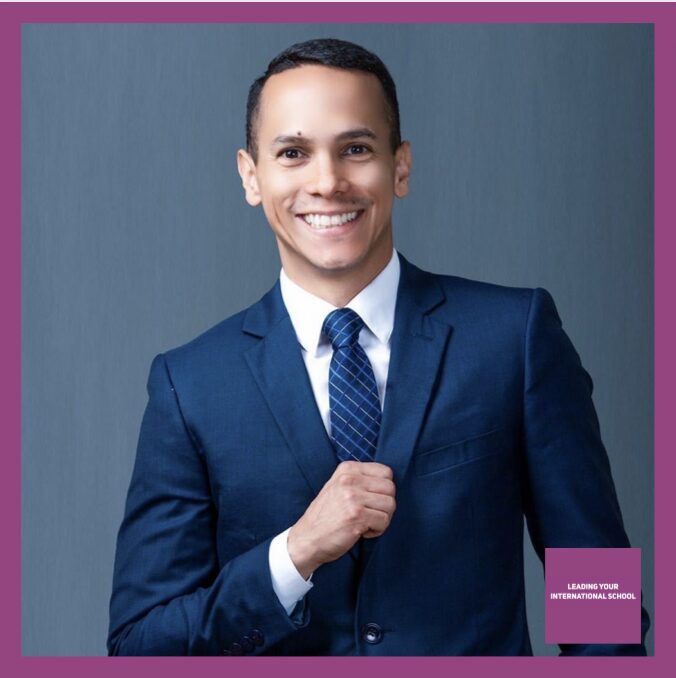by German Rincon M.S.Ed.
At the end of the 2021 – 2022 academic year, we felt that our international department was reaching a plateau regarding professional development. During previous years, we built structures and systems with our HR team to support our teachers’ growth and learning, effectively increasing staff retention by 30%. We wanted to make something different besides other “classical” forms of professional development, like IB courses, in-house training sessions, or online workshops. Our department wanted to involve the team in a collaborative development journey that serves teachers and the team and sets new development dynamics for the school. This thinking exercise led us to identify project management as an excellent opportunity to put into practice what they had learned in previous years of PD. Project management was the call! We were about to embark our team on a journey to work on our school learning climate (Double and Cook, 2023), “Developing an international school learning climate takes a considerable amount of careful planning and effort” (p.50) – an exciting challenge and opportunity ahead.
How Can We Define Project Management?
Project management refers to planning, organizing, and executing tasks and resources to achieve specific goals within a defined timeframe. It involves initiating, planning, executing, monitoring, controlling, and closing a project to meet the desired objectives while adhering to time, cost, and quality constraints.
Having Identified a Suitable Approach for PD, We Started Defining Our Purpose and Goals.
After presenting the idea to the team, we decided to create the 1st WFLK (World Foreign Language Kindergarten) IHT (International Homeroom Teacher) Annual Forum, inviting our sister schools (Baoshan and Hefei), holding a half-day event for up to 65+ people, including 55 (IHTs), parents and leaders from three different schools. Then we moved to identify what we wanted to share about ECE best practices – Student Agency – This planning stage started around mid-December, and we set the forum date to May, around a five-month project.
The Road to Creating Our Annual Conference:
- Planning and scheduling: The first step was to arrange our team of 22 IHTs into committees; every teacher signed up for their desired committee based on their skills and interest to dive into a different learning journey. We created the following teams (we used a shared file that later served as the project’s master form):
- Marketing and PR: Arrange the promotion of the forum (making everything look “pretty”), design the presenters’ posters, handle the communications between committees, connect people from the international department with other school departments if necessary, get approvals from the admin and the principal office, and channelling the forum’s needs.
- Protocol: Prepare and hand out the forum invitations, design a protocol plan to welcome the guests, and have everything ready to make the “customer experience” a five-star service. Make sure that the forum agenda runs on time. Design the theatre layout, prepare the snacks, and connect with the admin manager to provide F&B service.
- Finance: Handle budgeting and connect to the finance department to provide resources – reimbursement applications – according to the schedule.
- Academic: Design the forum presentations framework (six in total), audit and standardize the content. This team includes the IT teacher and the hosts.
After the teams were formed, I assigned team leaders (based on seniority) to lead each committee and have close communication with me as the forum director. This arrangement provided leadership opportunities for our senior teachers, giving them the platform to implement their own leadership style strengthening their agency and keeping them and teachers accountable. Collaboration was vital during the planning stage, as Katzenbach & Smith (2005) state “A team’s performance, by contrast, calls for both individual and mutual accountability.
- Building-up: The second stage led to teams working independently around each committee’s tasks and responsibilities. Having a reasonable time frame (5 months) gave us opportunities to discuss, plan, and reflect on strategies to bring out the best of each individual and team performance. Teachers enjoyed working with teachers they usually do not due to grade arrangements and communicating with stakeholders they have limited access to. This stage kept our community together and brought a fresh perspective of our PLC as “much of the work of a PLC cannot be done by a team but instead requires a schoolwide or districtwide effort” (Defour et al. 2016).
- Implementation: Getting close to the date, we used the master form to apply weekly checkpoints to measure the team’s readiness; we held rehearsals – led by the protocol team – and moved to a more detailed-oriented stage to guarantee a high-stakes readiness level. This approach of having high expectations led the team to understand the importance of modelling the behaviours and the learner-productive attributes we want our students to display. This stage helped us prepare for any possible crisis management and have contingency plans in case the forum faced any major challenges during D-day.
- Show time and reflection: The forum day was pure joy; it was a time to celebrate a successful team effort and enjoy a professional learning journey where everyone had the chance to display agency (voice – choice – ownership). The team cohesion let us focus on learning from the presenter’s expertise, be curious and imagine diverse forms of implementation in the classroom. We had the chance to reflect after the forum and were given two weeks to get back and reflect after we cooled off the excitement of a major accomplishment. We now have adopted four agency programs (one per grade) that are part of our core curriculum as the result of sharing our teachers’ best practices.
Due to the outstanding results, the annual forum is now part of our core practices, and this year, we will have WFLK Baoshan hold the 2024 edition.
Conclusion
By adopting project management principles, we were able to promote teacher agency, create a dynamic learning climate and inclusive professional development culture, and foster a collaborative professional development approach within our international department. Recognizing the need for a fresh and innovative approach, we embarked on organizing the 1st WFLK IHT Annual Forum, bringing together teachers, parents, and leaders from different schools. Through careful planning, committee formation, and clear goal-setting, we successfully executed the event, showcasing the best practices in early childhood education and empowering our teachers to take ownership of their professional growth. As we continue to explore innovative approaches, we remain committed to empowering our teachers and fostering a community of lifelong learners dedicated to delivering exceptional educational experiences to our students.
We were able to embrace the learning climate approach from André Double (2023), “As an international principal, keep learning the primary focus in your school. You need to develop a highly successful learning climate, build learning-centred classrooms, engage in purposeful learning conversations with staff, and facilitate highly effective learning communities”(p. 51)
Note: Feel free to scan (WeChat)the QR code below to have a quick peek at our 1st WFLK IHT Annual Forum day.

References:
Double, André; Cook, Warren. Leading Your International School: Practical Steps To Make Your People Count (p.50-51). 16 Leaves. Kindle Edition.
Jon R. Katzenbach and Douglas K. Smith. Harvard Business Review, July-August 2005.
DuFour, Richard; DuFour, Rebecca. Learning by Doing: A Handbook for Professional Communities at Work, Third Edition (A Practical Guide to Action for PLC Teams and Leadership, p. 39). Solution Tree Press (2016).
German Rincon is a Teacher Educator, Education Consultant, Foreign Vice-Principal and IB PYP Coordinator at Shanghai WFLK.
German Rincon is a Teacher Educator, Education Consultant, Principal and IB PYP Coordinator.
To connect with German on LinkedIn, click here
